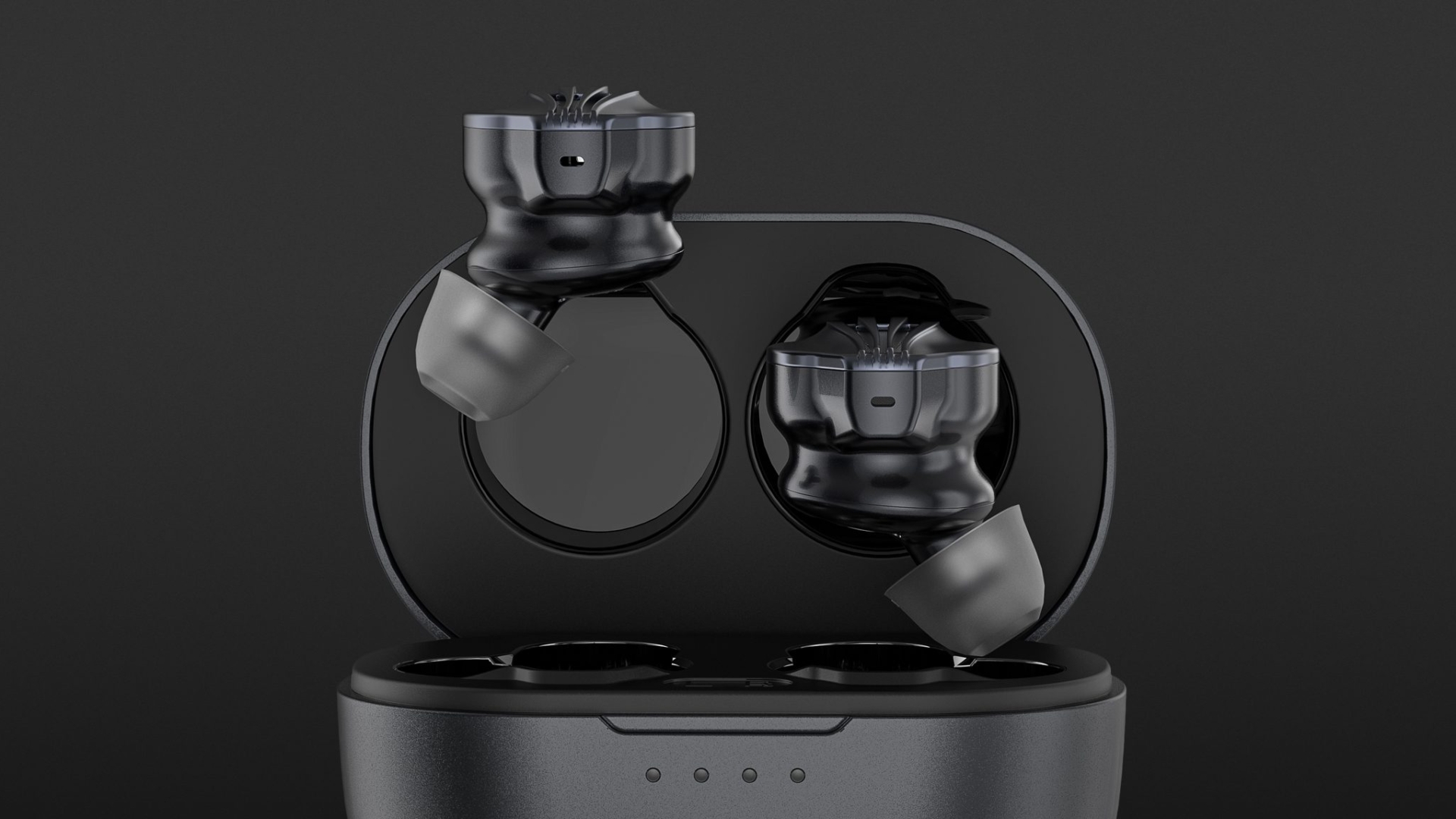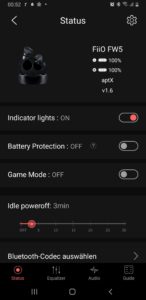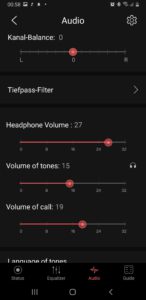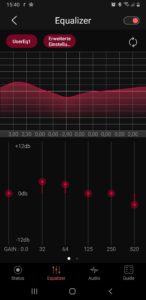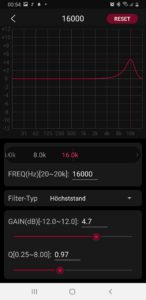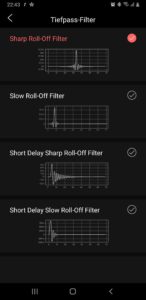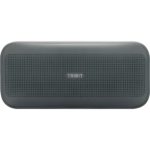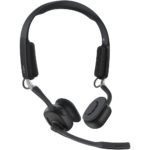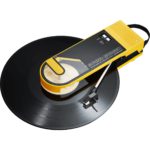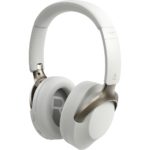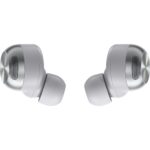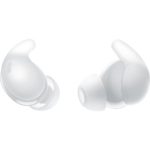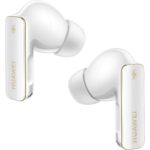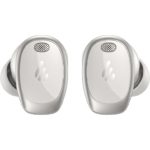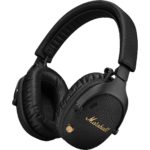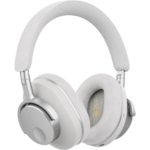The FiiO FW5 are solid True Wireless in-ears with well-matched components, impeccable technical data and a correspondingly neutral sound. What makes them special is the powerful equaliser, which gives the sound almost any desired characteristic. Accordingly, the FW5s are primarily recommended for hi-fi enthusiasts who would enjoy modelling their own ideal sound curve.
- Balanced and unstrained sound
- Good spatial representation
- Professional multiband equaliser (via app)
- Very good customisation options (via app)
- Function buttons are difficult to operate
For well over ten years, Chinese audio hardware manufacturer FiiO have been enriching the domestic hi-fi landscape with a wide range of audio components. This extends from a wide variety of headphones to DAC converters, Bluetooth transponders/receivers, digital amplifiers and audio players – even including a classic analogue “Walkman”.
The name “FiiO” is derived from their claim to combine “High Fidelity – HiFi for short” with digital technology (“1” & “0” accordingly: iO). Their FW series, which we are testing here, see the manufacturer’s promise to consolidate their expertise in Bluetooth transmission, DA conversion and headphones into a compelling pair of in-ear headphones. Let’s listen and find out more.
What do you get?
According to the manufacturer, the overall design of the FW5 should be impressive, as all the components have been designed for hi-fi quality: These range from the Bluetooth chip (Qualcomm QCC5141 with Snapdragon Sound) to the transducers (AK4432), which have a dynamic range of 108 dB (!) and distortion below 0.0016%, to the actual driver array, which consists of two balanced armature (BA) high-frequency drivers supported by a dynamic 10 mm full-range driver.
The package includes a comprehensive set of silicone ear moulds, with two sets supplied in different sizes: One of these is called “Balanced”; the other corresponds to the manufacturer’s “HS18” set and these are characterised by the use of extremely thin and supple silicone. There is also a cleaning set consisting of two small brushes, a short USB-A to C cable and the charging cradle, which provides information about its charge status via four LEDs. The battery has enough reserves to fully charge the headphones around three and a half times, with the FW5 offering around seven hours of playing time when fully charged (depending on the outside temperature and listening volume, of course).
Look & Feel
In terms of appearance, the FW5s were obviously inspired by the design of the FD7, FiiO’s top-of-the-range model. When you open the charging cradle, you can see the neat backs of the two earpieces, which, with their three slightly curved lines that open upwards, are somewhat reminiscent of the design language of the “Art Deco” era. As a fine grid of holes can be seen through the rear panel, it seems unlikely that the FW5s would be waterproof. Accordingly, their IPX class only goes up to 4 (protection against splashes of water).
There are two small buttons on the top of both earpieces that can be used to call up a complete set of media and telephone control functions. However, in practice, these are very fiddly to operate because they are really very small and also – depending on the shape of your ears – get in the way of the ridge of the outer ear. Important: When adjusting the volume via the earpieces, it is essential to realise that you are not (!) adjusting the volume of your player but that of the integrated amplifier. It is, therefore, possible, for example, to turn the volume on your mobile phone to full while the in-ears remain quiet (and vice versa). The correct way to adjust the volume here is to always operate the amp at full power and then adjust the volume on the player.
FiiO app
Many functions have been packed into the FiiO Control app, which is available as a free download for both iOS and Android. There are many controls available here, from battery protection (charging only up to 80%), the optional gamer mode (reduced latency), setting the length of time until standby, to the Bluetooth codec (aptX, AAC, LHDC, LDAC). The ability to adjust the balance between the headphones and between calls and signal tones is something that is found far too rarely in the control features of other headphones.
When you access the equaliser, it becomes clear why FiiO are positioned in the hi-fi market. There are ten frequency bands to allow you to adjust the sound to suit your personal preference. If that wasn’t enough, each band is also fully parametrically adjustable: i.e. the operating frequency, the characteristic (peak/shelf), as well as the quality (Q factor: 0.25 – 8) and the level range (+/- 12 dB). And then it gets really nerdy; you can even select the algorithm of the global high-pass filter. There are four models, allowing you to switch between steep and soft slopes and phase-linear or adaptive behaviour – wow! In the end, such subtleties can hardly be distinguished acoustically, but it’s still good to have the choice to make these adjustments. Personally, I liked the soft, phase-linear characteristics in the bass range the best.
- Practical: Firmware update via the app.
- The app offers extensive setting options.
- You can customise the balance between the system volumes.
- The FiiO app offers a powerful equalizer.
- All ten bands are parametrically adjustable.
- The high-pass filter can also be modified.
How do the FiiO FW5s sound?
According to the FiiO press release, their declared aim was to leave out as many sound-colouring components as possible: Active Noise Cancelling (ANC) is therefore not included, and neither are these headphones fitted with factory DSP optimisation. This means you can listen to the largely unadulterated sound of the three-way system, consisting of two Knowles BA drivers and a dynamic 10-millimetre driver.
And the basic characteristics of the FW5s confirm that the developers have done a good job, because the speakers sound excellent even with a neutral positioning of the equaliser: very neutral, with a little bit of treble sparkle. This is an ideal starting point for modelling individual sound preferences with the app’s excellent equaliser. Three EQ curves are available in the factory settings: “Classic”, “Pop” and the familiar “Harman curve”. However, in my opinion, they were all pretty rubbish because they have far too many bands activated (every active equaliser band also generates phase shifts, so you should use as few as possible), which then also have an unnecessarily large level range. Of course, that is all a matter of personal taste – but the FW5s don’t actually need very much adjustment to make them sound exciting:
My preference: 1 dB more boost at 64 and 2 dB at 32 Hz, then manually set the 500 Hz band to 480 Hz and reduce it there by 2 dB, followed by a small dip of 1 dB at 8 kHz and finally manually switch the last treble band to high-shelf, set the operating frequency there to 10 kHz, set the Q factor to a gentle 0.45 and boost the treble by 2 dB (audio professionals will probably already have recognised that this is the classic “sweetening curve”). This makes the FW5 significantly more muscular in the bass and more brilliant in the treble and boosts your listening pleasure accordingly.
Conclusion
I would like to give the FiiO FW5 the full five stars for the basic idea that underpins the concept. Tuning in-ears as neutrally as possible and dispensing with sound-colouring or optimising components such as Active Noise Cancelling or DSP optimisation, but instead providing an extremely powerful, fully parametric 10-band equaliser for personal sound design via app control, should be the ideal solution for all in-ears. And this plan works, because these in-ears, with their very neutral basic sound and high impulse strength, have enough reserves to effectively present individually customised sound.
As a result, the FW5s are real sound all-rounders that can be seamlessly tuned from discreet background sound to flashy loudness behemoth. This, combined with their reasonable price, would actually justify full marks if operation via the tiny buttons on the top of the housing wasn’t so impractical, for this handling I will deduct half a star. I will also deduct half a star for the fiddly buttons on the top.
In the end, however, this doesn’t change the very positive overall impression that the FW5 create. They are primarily aimed at hi-fi enthusiasts who can do something with the powerful equaliser and who will enjoy shaping their personal sound preference so that these in-ears become truly individual.
Technical specifications
- Ear couplingIn-ear
- Typeclosed
- Transducer principledynamic + balanced armature
- Frequency response (headphones)20 - 20.000 Hz
- Impedance32 ohms
- Sound pressure level (SPL)108 dB
- Weight without cable6.4g each, case ca. 44.4 g
What's in the box
- HS18 earplugs (S, M, L)
- Balanced earplugs (S, M, L)
- Cleaning brush
- USB charging cable
- Charging case
Special features
- BT codecs: SBC, AAC, aptX, aptX Adaptive, LHDC
- BT version: 5.2







